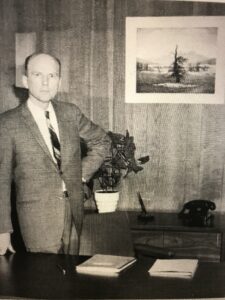Last month, the Canadian Parliament hailed the Ukrainian Yaroslav Hunka, a veteran of the Nazis’ Waffen-SS Galicia Division, as a “Canadian hero.” It soon emerged that the late Peter Savaryn, chancellor of the University of Alberta, had fought in the same unit as Hunka. This should not have been a surprise.
As “60 Minutes” explained in 1997, after World War II Canada welcomed thousands of Nazis into Canada, including war criminals. Officers of Hitler’s military also entered, and one of them was my high-school principal.
In 1963, I enrolled Essex District High School, near Windsor, Ontario. The new principal was Wolfgang Egon Franke, who had been a Kapitanleutnant in the Kriegsmarine, Hitler’s navy. That was a concern for many families, particularly ours.
In 1941, my father Kenneth Billingsley was only 17 when he lied about his age to join the Canadian Army. When turned out, he signed on with the Merchant Navy and served for the duration, in constant danger from German U-boats. Now his son would have to take orders from a former Kriegsmarine commander, who looked the part.
The ramrod-stiff Franke was straight from central casting and I could picture him saying “ve vant zuh names. You haf zem, yes?” The Kapitanleutnat issued students with a “Code of Manners” that banned blue jeans and urged girls to shun makeup. The principal was fond of quoting Goethe but didn’t talk much about his own past. The details are a bit sketchy.
Wolfgang Franke was born on April 14, 1915 in Horstmar, near Dortmund. He graduated high school in 1934 and after teacher’s college joined the Kriegsmarine, which schooled him in radio and communications. No word when Wolfgang joined up, or what service he rendered during the Nazi-Soviet Pact, when Hitler and Stalin were allies. No word of what Wolfgang was doing on November 9-10 1938, when Kristallnacht went down.
No word if Franke was ever a member of the National-Sozialistische Deutsche Arbeiterpartei, the National Socialist German Workers Party, also known as the NSDAP or Nazi party. It is certainly possible, and not something a former German military officer would want to advertise. As it happens, Kriegsmarine Admiral Karl Dönitz was a devoted Nazi and Hitler’s designated successor.
According to the Globe and Mail, Franke “served in the Navy and by the end of the war was a Lieutenant Commander, in charge of radio communications in Trieste, Italy.” After the war, Franke “survived four years of hardship in a concentration camp in former communist Yugoslavia.” Just to clarify, “the Navy” was Hitler’s Kriegsmarine, and “the war” was World War II. The “concentration camps,” as other accounts correctly noted, was a “prisoner of war camp.”
Franke came to Canada in 1951 but no word of any screening for wartime service that took the lives of Allied soldiers and sailors, particularly Canadians. Franke graduated from the Universities of Toronto and Ottawa, got the principal’s job at Essex High School, and moved on to college presidencies in Sarnia, Ontario, and Prince George, British Columbia. The veteran of Hitler’s Kriegsmarine died in 2007 at the age of 92, a good life in the nation he once sought to destroy.
A qualified Canadian would have been a better choice to teach the children of Canadian WWII veterans. At the time, I had no clue that service to Adolf Hitler and his National Socialist regime proved no bar to advancement.
During the 1980s, Canadian Prime Minister Brian Mulroney set up the Deschênes Commission to probe Nazi war criminals living in Canada. Trouble is, the key part of the commission’s report remain off-limits to the public. That doubtless accounts for the career of Savaryn and praise for Hunka as a Canadian hero. That atrocity prompts this writer to name a few men who might qualify as heroes.
My grandfather, Lorne Henry Billingsley, served for the duration in World War I and was one of the first victims of German poison gas attack. In the Merchant Navy, my father helped keep the troops supplied, and without this service the Allies don’t win. My uncle James Richard Billingsley fought with Canada’s Eighth Reconnaissance Regiment and was wounded twice, once by a Nazi sniper. None of these men was ever hailed as a Canadian hero in Parliament.
After the Hunka affair, Uncle Jim would have had some colorful words for Prime Minister Justin Trudeau, and one of them would have been “resign.” His fellow troops in the Eighth Reconnaissance would have done likewise.
On April 12, 1945, they liberated the Westerbork transit camp in Holland, where the Nazis shipped Dutch Jews to Auschwitz and Sobibor. The 876 inmates who remained were glad to see the Canadians. A few veterans of the regiment might remain, but in current conditions a standing ovation in Parliament is too much to hope for.
Canada has yet to be de-Nazified and German Nazism has a successor in Islamic Nazism, now killing Jews in Israel and around the world. For that conflict, my grandfather’s fellow soldier John McCrae has words that apply:
Take up our quarrel with the foe
To you from falling hands we throw
The torch, be yours to hold it high.

Notice: All comments are subject to moderation. Our comments are intended to be a forum for civil discourse bearing on the subject under discussion. Commenters who stray beyond the bounds of civility or employ what we deem gratuitous vulgarity in a comment — including, but not limited to, “s***,” “f***,” “a*******,” or one of their many variants — will be banned without further notice in the sole discretion of the site moderator.